Events
A Festive General Assembly of the Lithuanian Academy of Sciences
21 12 2022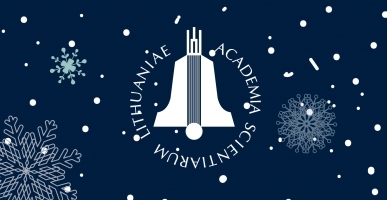
On 20 December, members of the Lithuanian Academy of Sciences gathered for a festive general assembly, which was attended not only by the members of the Academy, but also by guests from the Ministry of Education, Science and Sports, from Kaunas Municipality, and also by the Young Academy members. The event opened with a minute of silence in honour of the academicians Leonardas Sauka, Antanas Praškevičius, Adolfas Laimutis Telksnys, Vytautas Kaminskas, and the young academician Jurga Miliauskienė. After that, the Presidium and the members of the divisions of the Academy congratulated the members celebrating significant anniversaries. Commemorative medals of the Lithuanian Academy of Sciences were presented to the academicians Algimantas Grigelis, Česlovas Jukna, and Zigmantas Kiaupa. Congratulatory addresses were dedicated to Rimvydas Petrauskas and Bonifacas Stundžia. In advance, the assembly congratulated Prof. Jūras Banys, President of the Lithuanian Academy of Sciences, on the occasion of his 60th anniversary.
The event continued with the award of the Meilė Lukšienė Prize. Vytautas Nekrošius, chair of the competition jury, reminded the audience that this prize was established in 2014 and awarded every four years. This time, the jury considered six candidates and decided unanimously to award the prize to the educationist Dr Lilija Duoblienė and the philosopher Prof. Jūratė Baranova (posthumously) as their work reflects Meilė Lukšienė’s ideas and strategies particularly well.
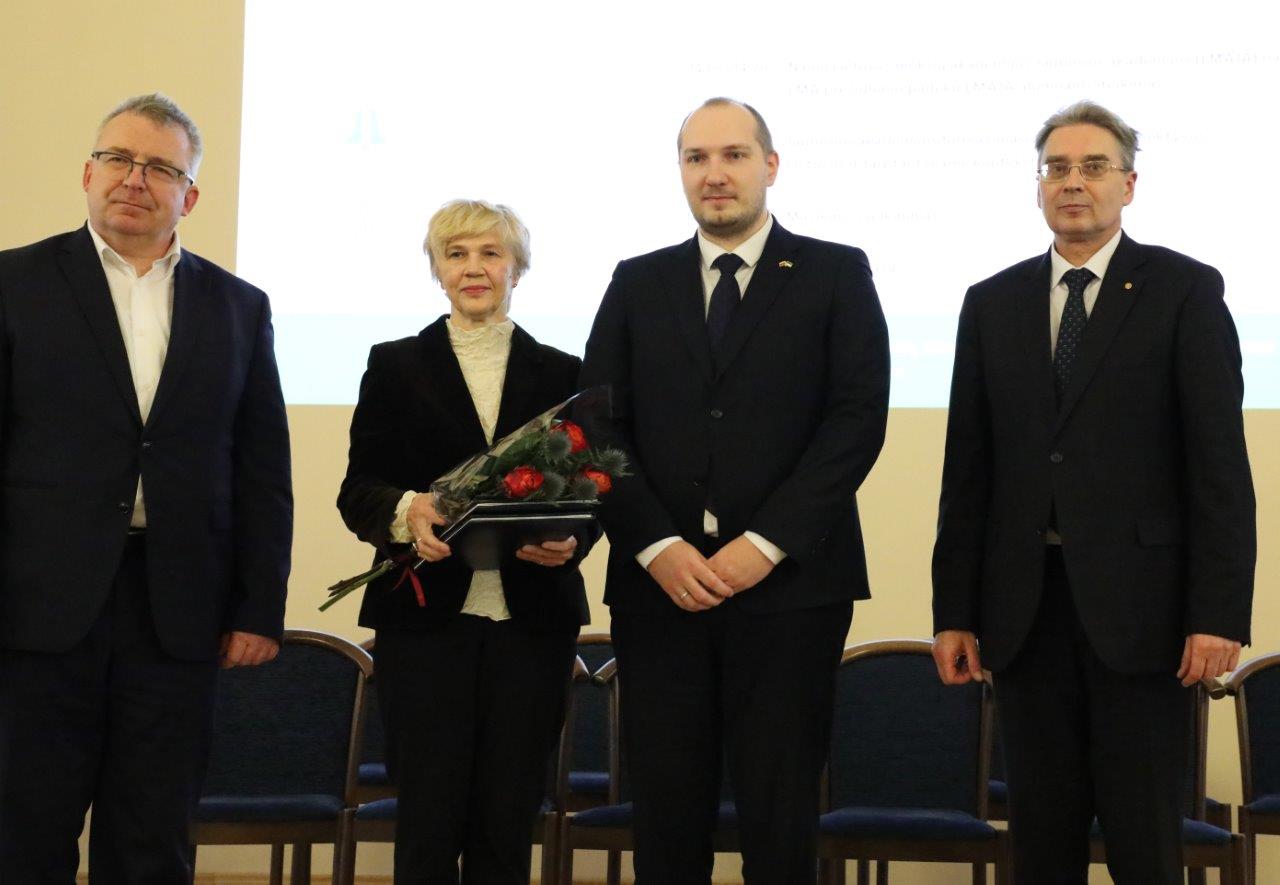
From the left: V. Nekrošius, L. Duoblienė, G. Jakštas and J. Banys
In his speech, Gintautas Jakštas, vice minister of education, science and sport, said he was very pleased to be among talented scientists. He observed that a crisis can often become an opportunity and that was how scientists around the world seized the opportunities presented by the pandemic. The rallying of researchers from different disciplines helped the world to get out of this global crisis faster and with fewer losses. This led to larger investment in science. Focus on science, inter-institutional cooperation seems to be the key to success. This is confirmed by the concerted action of scientists at the outbreak of war in Ukraine. He was therefore very pleased to congratulate the winners of the Meilė Lukšienė Prize, whose work reflects this kind of creative interdisciplinary cooperation and reinforces the Western philosophy of education.
In her thank-you speech, Dr Lilija Duoblienė remembered her colleague and teacher Jūratė Baranova. They started collaborating as practitioners. Later, they also undertook research and joint projects. Their first idea was to bring philosophy to Lithuanian schools. The second idea was to develop creativity and cultural literacy among pupils and teachers. As teachers often lack autonomy and creativity, the aim was to change the situation to provide future generations with a broad cultural horizon.
This was followed by the honouring of the winners of the Kaunas City Scientist Prize 2022. In the field of humanities or social sciences, Prof. Gintautas Dzemyda, chair of the jury, announced the jury’s proposal to award the prize to Dr Vaidas Petrulis, an architectural historian, for his active and culturally innovative scientific activity, an innovative scientific idea, and its implementation in Kaunas. In the field of physical sciences, biomedicine, or technologies, Dr Petras Rimantas Venskutonis was recognised for his research and development of technologies for the production of functional foodstuffs and for his research on biologically valuable compounds of plant origin and thermal reactions in food, for creation of a new school of science in these fields in Lithuania. Eglė Andriuškienė, deputy director of Kaunas Municipality Administration, Prof. Jūras Banys, and Prof. Zenonas Dabkevičius, vice president of the Lithuanian Academy of Sciences, presented the diplomas to the laureates and congratulated them.
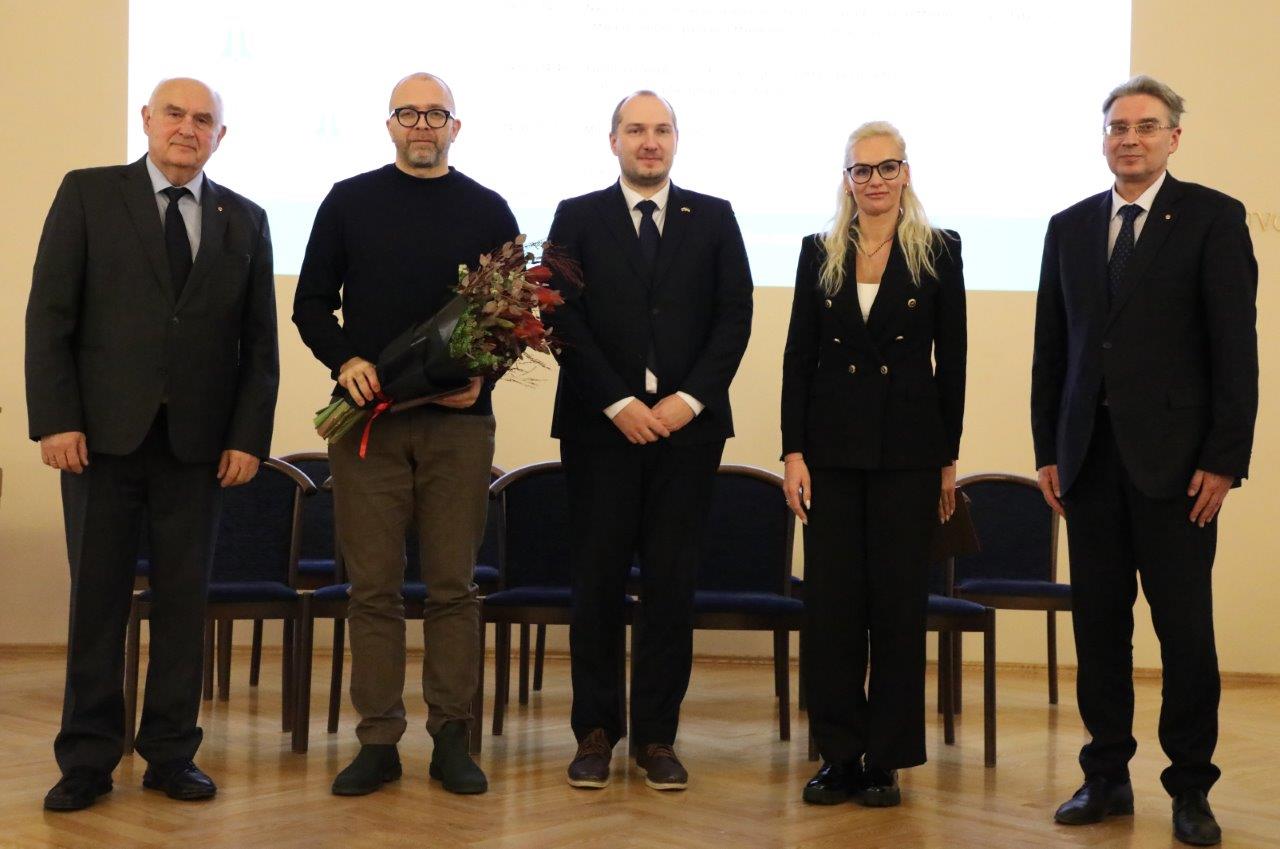
From the left: G. Dzemyda, V. Petrulis, G. Jakštas, E. Andriuškienė and J. Banys
In his speech, Vaidas Petrulis thanked the management of Kaunas Institute of Technology for finding a place for the humanities in this higher education institution; he also expressed his gratitude to the Lithuanian Academy of Sciences, his colleagues from the Institute of Architecture and Construction, and the Architecture and Urban Research Team. He was pleased that the digital archive of Lithuanian architecture, which he developed with his colleagues, is being actively used, that studies on the history of architecture are popular among readers. He believes that the historical aspect, which helps to understand the context deeper and enriches the horizons of currently working architects, is becoming more and more important nowadays.
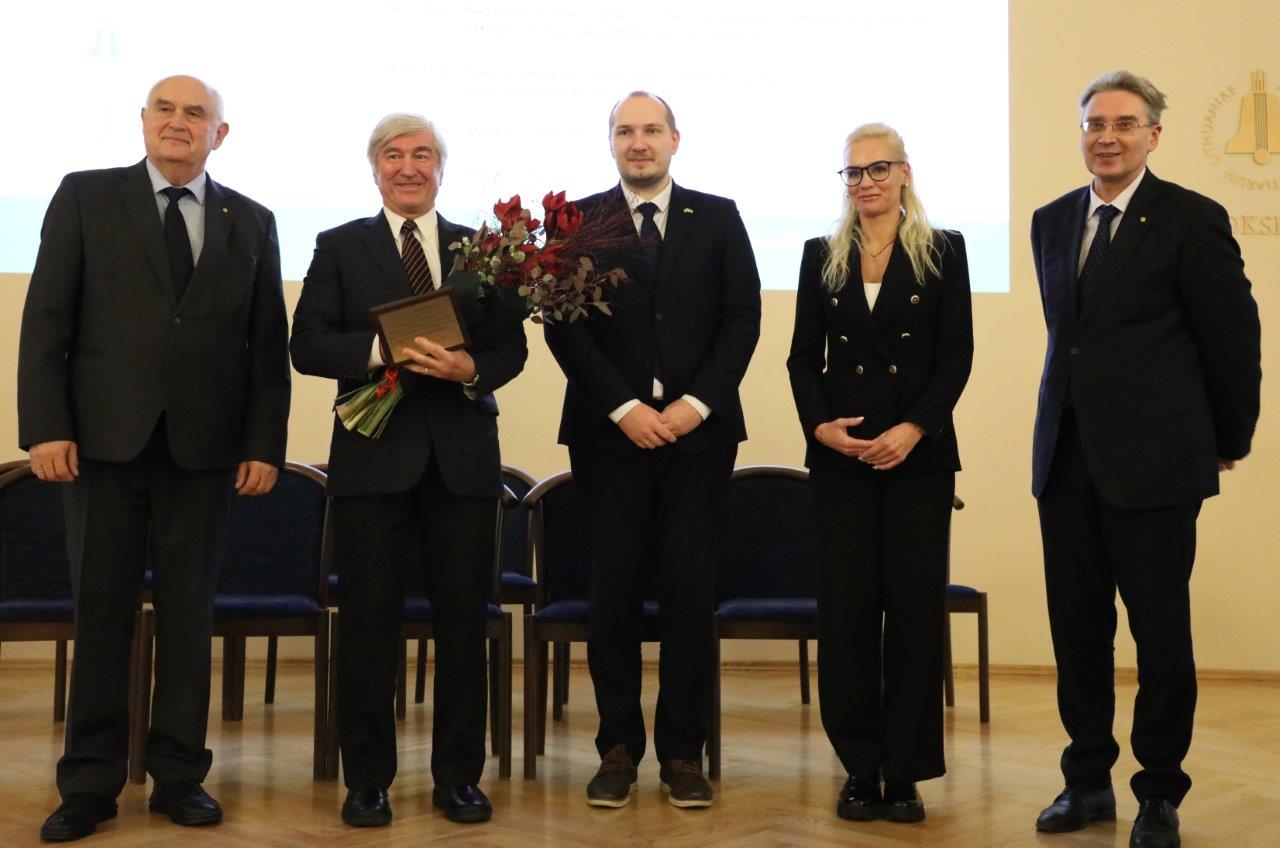
From the left: G. Dzemyda, P. R. Venskutonis, G. Jakštas, E. Andriuškienė and J. Banys
The second laureate, Prof. P. R. Venskutonis, also turned to history in his speech of thanks. He remembered the times when the re-establishment of independence opened great prospects for researchers. The equipment needed to develop functional foods and new food products was upgraded and students from the best and oldest Western universities now come to Kaunas for internships. Kaunas has always been famous for its food industry, so this award is a perfect reflection of the achievements and scientific potential of this field.
Eglė Andriuškienė, deputy director of Kaunas City Municipality Administration, said that she was proud of the cooperation with the Lithuanian Academy of Sciences. On behalf of the mayor of Kaunas, she wished the members of the Academy success in their creative and scientific endeavours and expressed hope that there would be even more candidates for this award next year.
This year marks the fifth election of ten new members of the Young Academy of the Lithuanian Academy of Sciences. The list of the new members and their achievements were announced by Prof. Zenonas Dabkevičius. The president and the vice president awarded the new members of the Young Academy with membership badges and certificates. The following new members joined the Young Academy this year: Dr Ignas Kalpokas (public communication, Vytautas Magnus University) and Dr Dovilė Pūraitė-Andrikienė (law, Vilnius University and the Lithuanian Centre for Social Sciences) joined in the domain of the humanities and social sciences; Dr Vytautas Klimavičius (physics, Vilnius University) and Dr Lina Mikoliūnaitė (chemistry, Vilnius University) joined in the domain of mathematical, chemical, and physical sciences; Dr Karolis Ažukaitis (medicine, Vilnius University) and Dr Darius Kazlauskas (biology, Vilnius University) are the new members in the domain of biological, medical, and geosciences; Dr Darius Kavaliauskas (forestry sciences, Academy of Agriculture of Vytautas Magnus University) and Dr Neringa Rasiukevičiūtė (agronomy, Lithuanian Research Centre for Agriculture and Forestry) joined in the domain of agricultural and forestry sciences, and Dr Gražina Korvel (informatics, Vilnius University) and Dr Andrius Tamošiūnas (energetics, Lithuanian Energy Institute) joined in the domain of technical sciences.
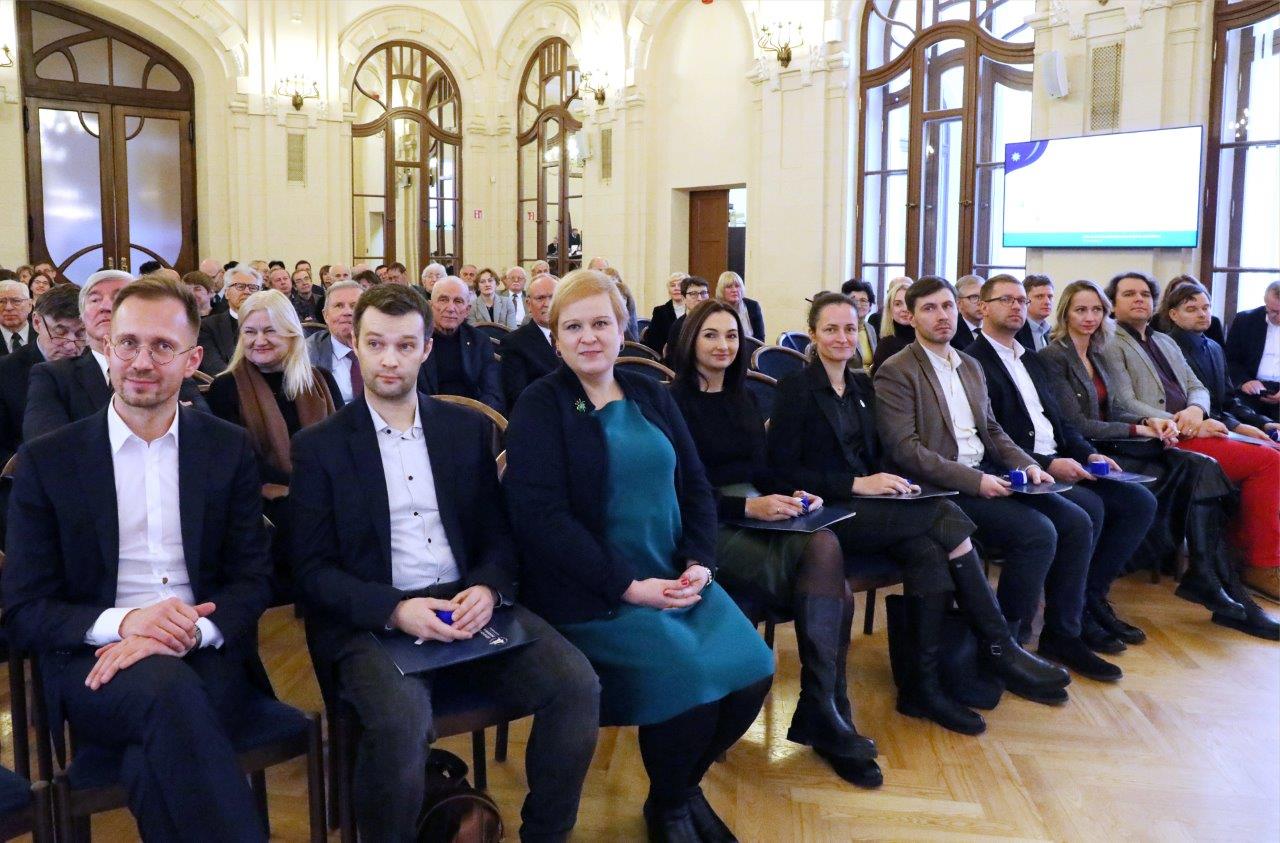
New members of the Young Academy
Elected in 2018, the first ten members of the Young Academy of the Lithuanian Academy of Sciences are already finishing their term of office. For their contribution to the activities of the Young Academy in representing the interests of young Lithuanian researchers, mobilising scientists for creative, scientific, and expert activities, raising the prestige of science and creating progressive Lithuania, Prof. Dr Mangirdas Malinauskas, Prof. Dr Edvinas Orientas, Prof. Dr Juozas Kupčinskas, Dr Olga Mastianica-Stankevič, Dr Donatas Murauskas, Dr Vaidas Palinauskas, Dr Diana Marčiulynienė, and Dr. Mindaugas Gedvilas were awarded letters of acknowledgement of the Presidium of the Lithuanian Academy of Sciences. The family of the prematurely departed Dr Jurga Malinauskienė accepted her Letter of Acknowledgement.
Dr Vaidas Palinauskas, chair of the Young Academy of the Lithuanian Academy of Sciences, talked about the formation, activities, and prospects of the Young Academy in the Lithuanian and international contexts. He reminded the audience that the Young Academy movement began 22 years ago with the establishment of the Young Academy in Germany. These organisations unite researchers aged 27-40 who have achieved significant results in a wide range of scientific fields. Currently, there are over 50 national young scientist academies and twelve similar structures worldwide. The European Young Academy was established in 2010. In 2018, the Lithuanian Academy of Sciences followed these examples and established its own Young Academy.
Young academicians represent the interests of their generation of scientists, carry out expert activities, disseminate scientific knowledge to the public, give lectures to schoolchildren, and collaborate with foreign colleagues. They also participate in international organisations and organise their own events, such as seminars on energy issues or the international gastroenterology conference.
Dr Palinauskas expressed his hope that the Young Academy would actively continue to expand its activities thus promoting the many-sided and smooth involvement of young scientists in the scientific ecosystem.
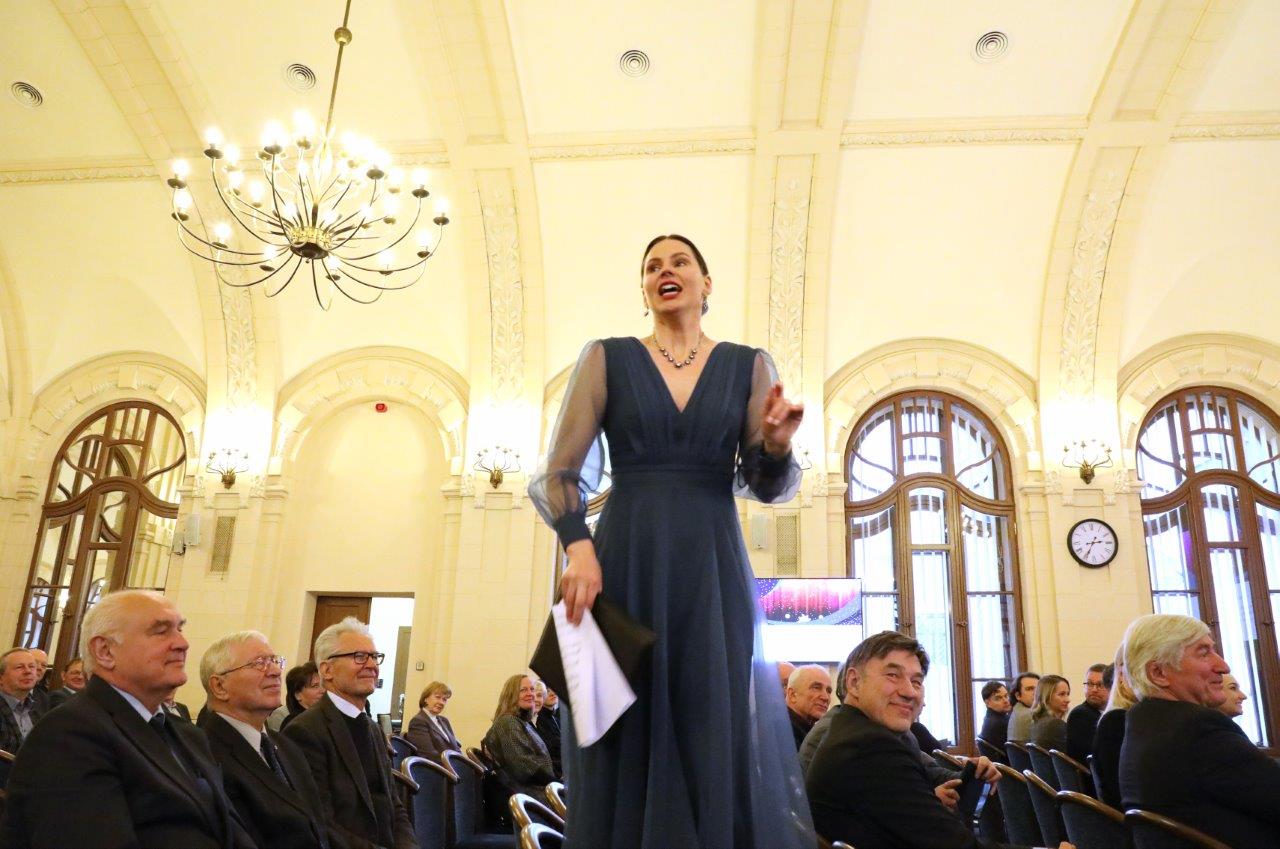
A moment of the concert, soloist A. Stančikaitė
The festive general assembly ended with a musical programme performed by the Cantus chamber orchestra and soloists.
At the very end of the meeting, Prof. Banys informed the audience that the Lithuanian academic community had raised €11,000, which were used to buy electricity generators for Ukrainian scientists. He wished everyone a beautiful and meaningful holiday season.
Dr Rolandas Maskoliūnas, chief specialist for public relations
Translated by Diana Barnard
Photographed by Virginija Valuckienė
